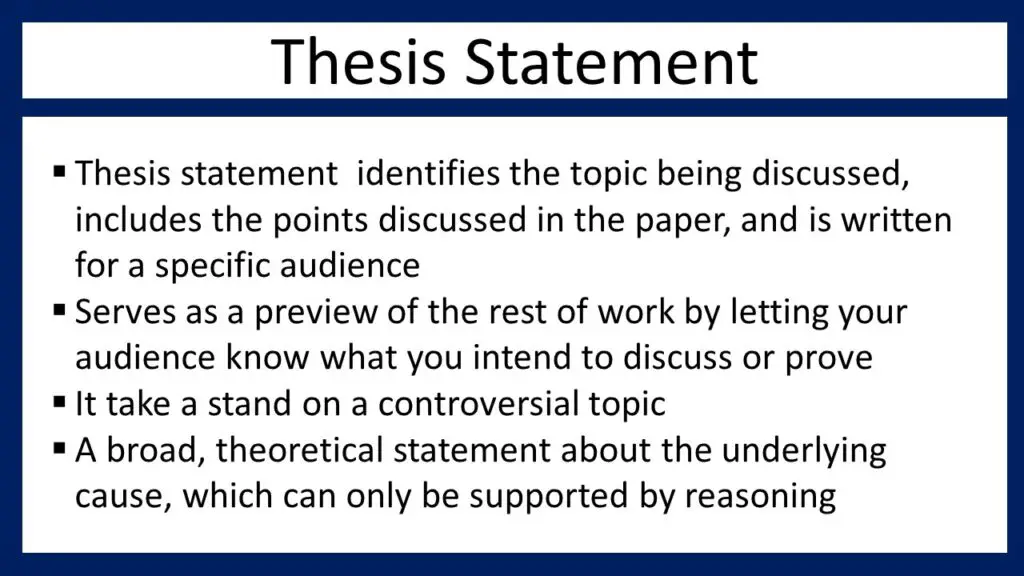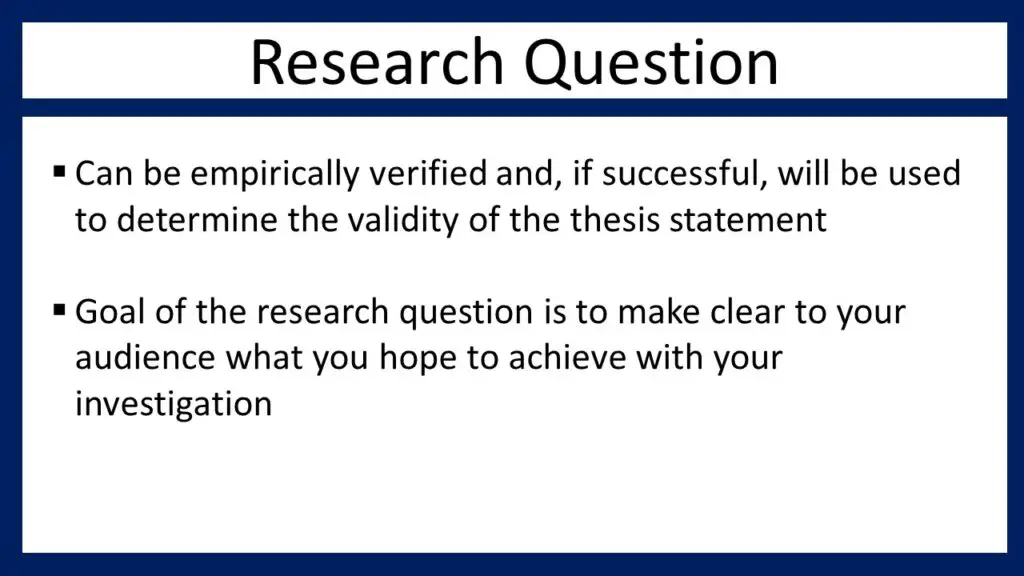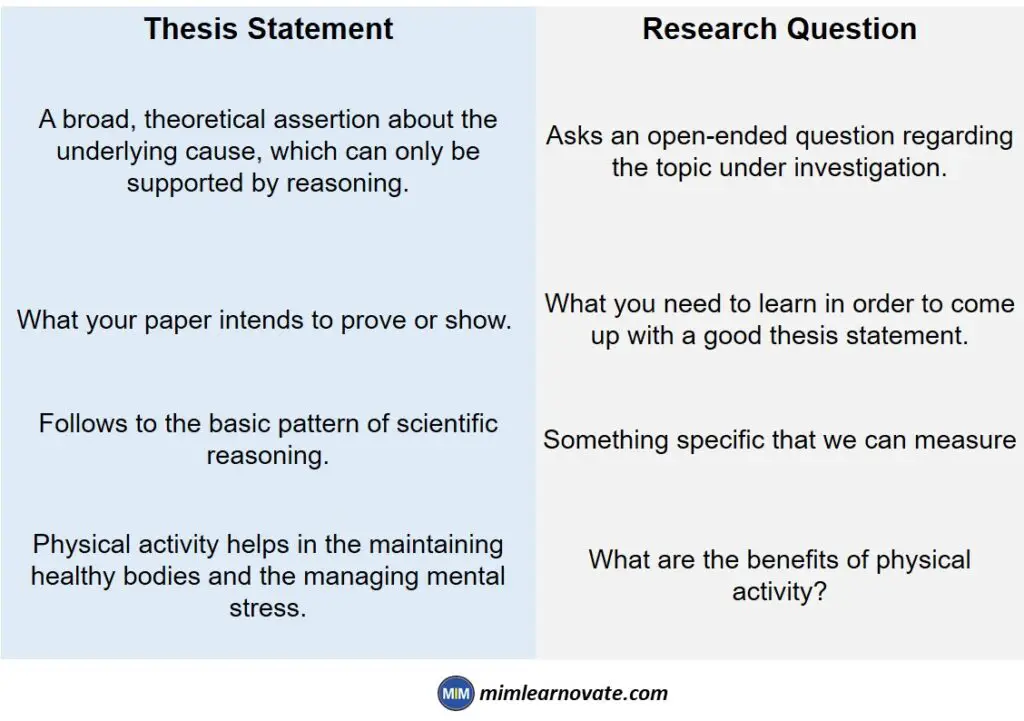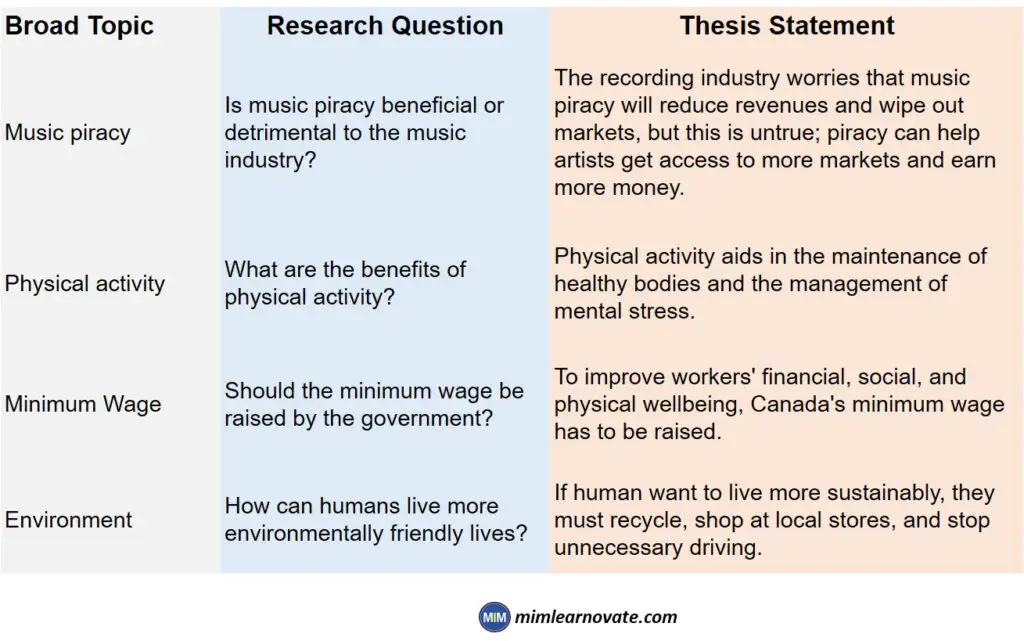Knowing whether to use a thesis statement or a research question will determine whether your readers are inspired or confused. In academic writing, both thesis statements and research questions are used to give the work a purpose and direction. However, different types of direction-giving are required for thesis statement and a research question.
thesis statement
Most of outstanding well-structured writing includes a thesis statement close to the start of the essay or paper and repeats it towards the conclusion.
The thesis statement serves as a preview of the rest of your work by letting your audience know what you intend to discuss or prove. Thesis statements take a stand on a controversial topic or give a fact. The rest of the paper shows the stand or gives more information to back up the fact.

A thesis statement is a broad, theoretical assertion about the underlying cause, which (typically) can only be supported by reasoning.
Research Question
A research question is a statement that can be empirically verified and, if successful, will be used to determine the validity of the thesis statement.
While most writings will have a thesis statement, only some types of writing will include one or more research questions. Research studies, such as those that are published in scholarly journals and scientific research publications, typically aim to learn new details about a little-known subject.

The goal of the research question is to make clear to your audience what you hope to achieve with your investigation. A research question ought to be arguable, but it should also be open question.
Difference Between a Thesis Statement and Research Question
- The two types of direction-giving at the beginning and end of academic writing serve different purposes. A thesis statement provides a positional statement about information. In contrast, a research question asks an open-ended question regarding the topic under investigation.
- A research question is always something specific that we can measure, unlike a thesis, which is always a claim about a universal—something we want to declare is always true in a certain setting. It follows to the basic pattern of scientific reasoning.
- The main difference between a thesis statement and a research question is that a thesis statement makes a claim that you will seek to validate in your paper.
Example: Thesis Statement Vs. Research Question
A thesis statement on the same topic could state,
“Competitive football provides many benefits to adolescent girls, such as exercise, but may also have negative effects, such as increased risk of concussion.”
A research question might ask,
“How does competitive football affect adolescent girls?
Thesis Statement Vs. Research Question
| Thesis Statement | Research Question |
| A broad, theoretical assertion about the underlying cause, which can only be supported by reasoning. | Asks an open-ended question regarding the topic under investigation. |
| What your paper intends to prove or show. | What you need to learn in order to come up with a good thesis statement. |
| Follows to the basic pattern of scientific reasoning. | Something specific that we can measure |
| Physical activity helps in the maintaining healthy bodies and the managing mental stress. | What are the benefits of physical activity? |

Similarities Between Thesis Statement and Research Question
- The direction of academic journal articles, research papers, reports of research studies, and qualitative investigations of events or texts can be established using both thesis statements and research questions.
- To ensure that the reader fully understands the work’s objective, both must be skillfully written by the researcher.
- Research questions and thesis statements must be precise, short, and purposeful in order to be effective.
How to Write A THESIS Statement TO ANSWER YOUR RESEARCH QUESTION
A research paper begins with a research question. Your thesis serves as a brief answer to your research question. It is the most important sentence in your research paper.
▶Start with a Research Question
It’s a good idea to begin a research writing with a research question.
Look at these example of research questions:
- Is music piracy beneficial or detrimental to the music industry?
- What are the benefits of physical activity?
- Should the minimum wage be raised by the government?
- How can people lead lives that are more earth-friendly?
To come up with your response to the question, you must now conduct research.
Determine your position and how you may use persuasive reasons to support it.
▶Creating a Thesis Statement
After conducting some basic research to determine your position and a few key justifications for it, you can craft a thesis statement. Your thesis statement responds to your research question concisely in one sentence.
The thesis statement expresses three ideas:
The specific topic of the paper, your opinion or position on it, and the main reasons for your opinion
The table below shows how a thesis statement develops from a broad topic.
| Broad Topic | Research Question | Thesis Statement |
| Music piracy | Is music piracy beneficial or detrimental to the music industry? | The recording industry worries that music piracy will reduce revenues and wipe out markets, but this is untrue; piracy can help artists get access to more markets and earn more money. |
| Physical activity | What are the benefits of physical activity? | Physical activity aids in the maintenance of healthy bodies and the management of mental stress. |
| Minimum Wage | Should the minimum wage be raised by the government? | To improve workers’ financial, social, and physical wellbeing, Canada’s minimum wage has to be raised. |
| Environment | How can humans live more environmentally friendly lives? | If human want to live more sustainably, they must recycle, shop at local stores, and stop unnecessary driving. |

Can you find the three key components of each of the above thesis statements?
▶Parallel Structure in Thesis Statements
The supporting reasons in each thesis are presented in a parallel structure.
▶Thesis Statement Placement
Your thesis statement is the single most significant sentence in your writing. The thesis statement usually comes at the end of the first paragraph in academic writing.
The first thesis statement you write will be a preliminary (or “working”) thesis statement. It will be necessary when you start organizing the information into an outline for your project.
You can reduce your working thesis statement if it is too wide or broaden it if it turns out to be too narrow for what you want to communicate as you continue to conduct research and develop your ideas.
Other articles
Please read through some of our other articles with examples and explanations if you’d like to learn more about research methodology.
Comparision
- Basic and Applied Research
- Cross-Sectional vs Longitudinal Studies
- Survey vs Questionnaire
- Open Ended vs Closed Ended Questions
- Experimental and Non-Experimental Research
- Inductive vs Deductive Approach
- Null and Alternative Hypothesis
- Reliability vs Validity
- Population vs Sample
- Conceptual Framework and Theoretical Framework
- Bibliography and Reference
- Stratified vs Cluster Sampling
- Sampling Error vs Sampling Bias
- Internal Validity vs External Validity
- Full-Scale, Laboratory-Scale and Pilot-Scale Studies
- Plagiarism and Paraphrasing
- Research Methodology Vs. Research Method
- Mediator and Moderator
Comparision
- Independent vs. Dependent Variable – MIM Learnovate
- Research Article and Research Paper
- Proposition and Hypothesis
- Principal Component Analysis and Partial Least Squares
- Academic Research vs Industry Research
- Clinical Research vs Lab Research
- Research Lab and Hospital Lab
- Thesis Statement and Research Question
- Quantitative Researchers vs. Quantitative Traders
- Premise, Hypothesis and Supposition
- Survey Vs Experiment
- Hypothesis and Theory
- Independent vs. Dependent Variable
- APA vs. MLA
- Ghost Authorship vs. Gift Authorship
Research
- Research Methods
- Quantitative Research
- Qualitative Research
- Case Study Research
- Survey Research
- Conclusive Research
- Descriptive Research
- Cross-Sectional Research
- Theoretical Framework
- Conceptual Framework
- Triangulation
- Grounded Theory
- Quasi-Experimental Design
- Mixed Method
- Correlational Research
- Randomized Controlled Trial
- Stratified Sampling
- Ethnography
- Ghost Authorship
- Secondary Data Collection
- Primary Data Collection
- Ex-Post-Facto
Research
- Table of Contents
- Dissertation Topic
- Synopsis
- Thesis Statement
- Research Proposal
- Research Questions
- Research Problem
- Research Gap
- Types of Research Gaps
- Variables
- Operationalization of Variables
- Literature Review
- Research Hypothesis
- Questionnaire
- Abstract
- Validity
- Reliability
- Measurement of Scale
- Sampling Techniques
- Acknowledgements
Statistics


